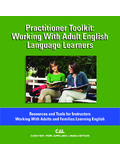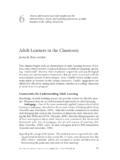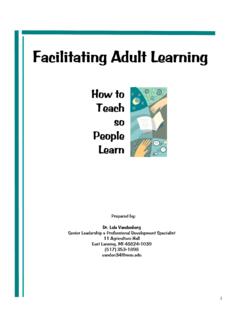Transcription of Core Competencies of Adult Learning Facilitators in Europe
1 Nils Bernhardsson / Susanne Lattke (eds.) Core Competencies of Adult Learning Facilitators in Europe Findings from a Transnational Delphi Survey Conducted by the Project Qualified to Teach Project Number: 504172-LLP-1-2009-1-DE-LEONARDO-LMP Grant Agreement number: 2009 2191 / 001 001. This project has been funded with support from the European Commission. This publication reflects the views only of the author, and the Commission cannot be held responsible for any use which may be made of the information contained therein. Partner organisations University of Groningen (RUG) Romanian Institute for Adult education (IREA) National Institute of Adult Continuing education (NIACE) Stockholm University (SU), Department of education Nicolas Copernicus University (UMK), Faculty of Pedagogy University of Florence, Faculty of education Science (UNIFI) Swiss Federation for Adult Learning (SVEB) Project Coordinator: German Institute for Adult education Leibniz Centre for Lifelong Learning (DIE) Nils Bernhardsson, Susanne Lattke bernhardsson@die-bonn,de Project partners contributing to this report.
2 Theo van Dellen, University of Groningen (RUG) Raluca Lupou, Andreea Siliman, Romanian Institute for Adult education (IREA) Ewa Luger, National Institute of Adult Continuing education (NIACE) Agnieszka Bron, Petros Gougoulakis, Stockholm University (SU), Department of education Ewa Przybylska, Nicolas Copernicus University (UMK), Faculty of Pedagogy Francesca Torlone, Dipartimento di Scienze dell'Educazione e dei Processi Culturali e Formativi (UNIFI) Irena Sgier, Swiss Federation for Adult Learning (SVEB) The data analysis on which Chapter 3 is largely based, was performed by Theo van Dellen, University of Groningen QF2 TEACH partnership 4 Table of contents 1. Introduction.
3 6 2. Discourse on professionalisation of Adult educators in Europe .. 7 Curricula for European Adult Educators Projects AGADE and EMAE .. 7 Mapping the field: The Q-ACT and ALPINE Studies .. 12 Validation of prior Learning of Adult educators The project VINEPAC .. 13 Research on core- Competencies of Adult Educators .. 16 3. The QF2 TEACH Project .. 19 The evolution of the QF2 TEACH project and questionnaire .. 22 QF2 TEACH Survey .. 24 Methodology - The 24 Designing the instrument first wave .. 25 Sample and features of the response groups first wave .. 27 Research results first wave .. 28 Factor analysis and results .. 28 Qualitative outcomes and additional items for the second wave.
4 33 Research results second wave .. 34 Sample and features of the response groups .. 34 Analysis second wave .. 35 Final Result of the Delphi survey: The transnational catalogue of core Competencies of ACE Learning Facilitators .. 39 4. Development of a concept for a transnational qualification framework for Learning Facilitators based on the EQF .. 42 Development of a first draft concept for a transnational QF .. 42 Strengths and weaknesses of the chosen approach and the proposed concept for a transnational QF .. 47 The Concept for a transnational qualification framework for Learning Facilitators in Adult and continuing education in Europe .. 50 5. Literature .. 63 6.
5 Appendixes .. 65 Appendix 4: Draft concept proposed at the transnational expert workshop on 6 September 2011 65 Appendix 1: QF2 TEACH Questionnaire first wave .. 66 Appendix 2: Interim result Concept catalogue of core competences for Learning Facilitators in ACE .. 82 5 NEW (UK/IT) Be enthusiastic, be passionate .. 83 NEW (UK/NL/RO) (Active) listening skills .. 84 Appendix 3: QF2 TEACH Questionnaire second 91 Appendix 4: Draft concept proposed at the transnational expert workshop .. 101 Appendix 5: The Europeans Qualification Framework for Lifelong Learning .. 112 6 1. Introduction The safeguarding and improvement of the professional quality of Learning Facilitators in Adult and Continuing education (ACE), as well as in other sectors of education , is considered today as one of the most challenging tasks for any society that wants to survive in the globalizing competition.
6 The term ACE Learning Facilitators refers to a variety of professional roles such as teachers, trainers, coaches, guidance and counselling staff and others. What these roles have in common is that a major part of the professional activity takes place in direct contact with the Adult learner(s) and consists in initiating, supporting and monitoring the Learning processes of these adults . The activities of Learning Facilitators can be considered as classical aspects of the work of most ACE professionals working in different domains of ACE, such as vocational education , corporate and functional education , social and moral education or cultural and arts education . Adult Learning Facilitators are mainly working in various contexts covering the entire field of Adult and Continuing education (ACE) consisting of a) formal Adult education institutions offering basic, general and vocational education and training, b) non-formal education institutions offering popular education , and c) work-related training and development mainly of non-formal character.
7 The QF2 TEACH project is conducted by a consortium which covers eight European countries and consists of university departments and non-university research and development institutes which are all specialized in Adult education . Project coordinator is the German Institute for Adult education (DIE). The main aim of QF2 TEACH is to determine the core Competencies needed by ACE Learning Facilitators today and in the future by conducting a Delphi study based on the assessments and opinions of a selected expert-panel. A second aim of the project is to develop a research-based concept for a transnational qualification framework for ACE Learning Facilitators , which is linked to the existing overarching European Qualification Framework (EQF), in an effort to determine visible and comparable qualification levels of Adult professionals throughout Europe .
8 7 2. Discourse on professionalisation of Adult educators in Europe Various European projects have been dealing with the issues of professional development of Adult educator s and (core) Competencies of Adult educators in recent years. (Bernhardsson/Lattke 2011). They vary in scope and focus and are therefore not directly comparable. Rather they approach the overall subject professional development / core Competencies from different angles and with different intentions. It is therefore interesting to have a closer look at some prominent examples of such projects and their achievements to see what common European ground has already been reached in the efforts towards a professionalisation of Adult educators.
9 Curricula for European Adult Educators Projects AGADE and EMAE Since the early years of the SOCRATES programme, quite a number of European Adult education projects have included some elements of teacher training, often as a by-product which had the purpose to introduce Adult educators and teacher trainers to the tools and methods that had been developed by the project in question (see Nuissl 1999, EAEA 2001). However, only in recent years the professional development of Adult educators as such has become a prominent topic in its own right of several European projects. One of these is the Grundtvig-Project AGADE A Good Adult Educator in Europe , which ran in the years 2004-06, coordinated by the Estonian non-formal Adult education Association and with partners from Hungary, Ireland, Latvia, Lithuania, Portugal, Sweden and Norway.
10 This project developed a set of minimum competence criteria for Adult educators and a modular training course combining elements of distance Learning and face-to-face education (see J ger/Irons 2006). This project focused on Adult educators working in a role of teacher , guide, facilitator and trainer. It did not cover other possible roles of Adult education staff in the fields of management, programme planning etc. For these (teaching) Adult educators the project identified the following set of minimum competence criteria which serve at the same time as a basis for the training curriculum: 8 Personal development area / ethic dimension self esteem tolerance responsibility communication skills empathy flexibility Professional development area Organising stage knowledge dimension Knowledge about how adults learn and understanding the psychology of adults Knowledge of methods in AE and Learning Skills in preparing value-based (democratic and humanistic)










